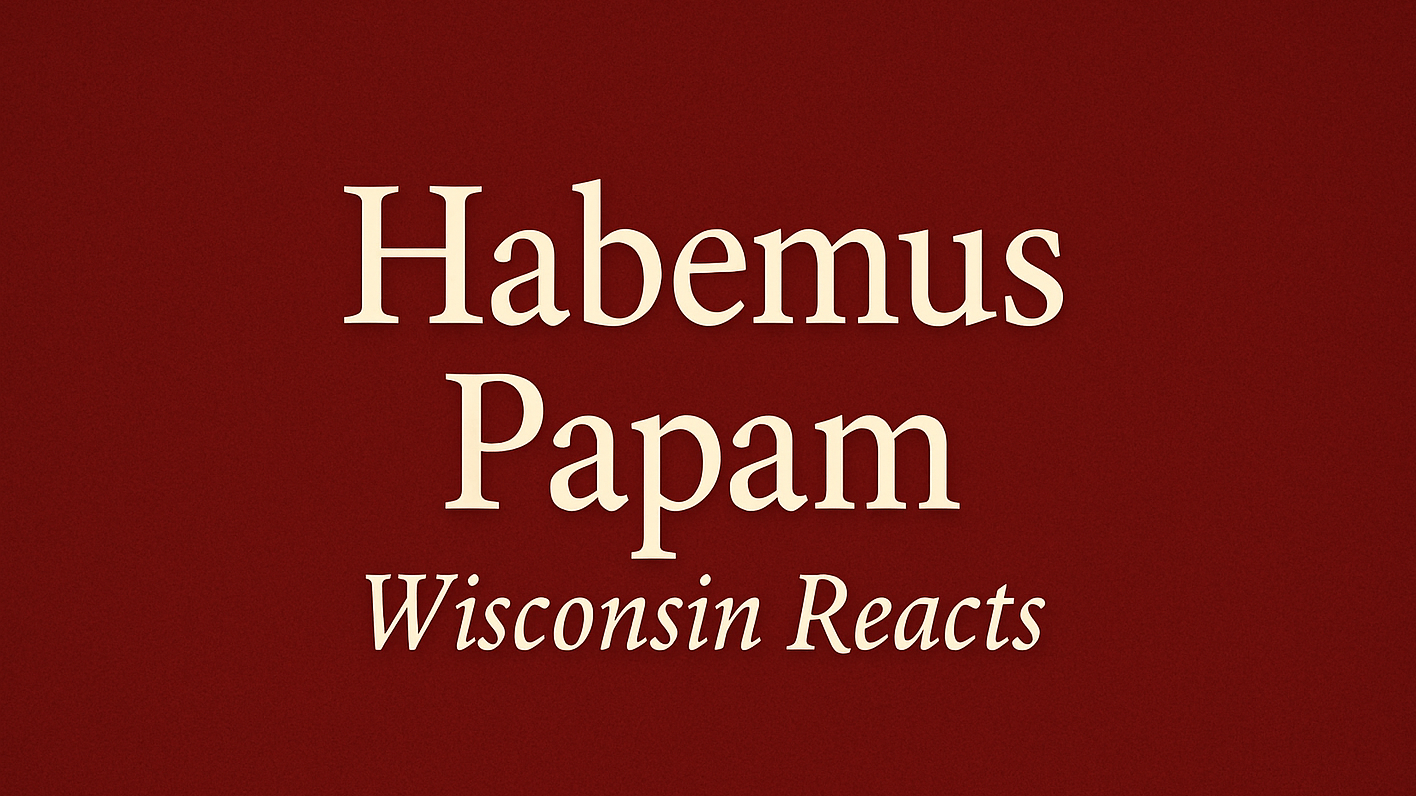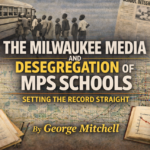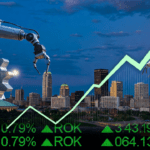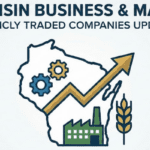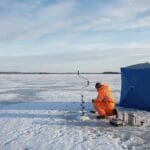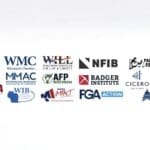May 8, 2025
We have an American Pope. Cardinal Robert Francis Prevost, born in Chicago in 1955 is Pope Leo X!V.
From the pews of Milwaukee’s parishes to the National Shrine of Our Lady of Champion in Brown County, local faithful are expressing a mix of hope, anticipation, and reflection on the future of the Church. As white smoke signaled the election of a new pope on the second day of the Papal Conclave, prominent Wisconsin Catholics shared their reaction.
We will update this post as additional comments are made.
“We rejoice with the Universal Church for what God has done in giving us a new successor to St. Peter. The wonderful qualities that already have been seen in the life and ministry of our new Holy Father, Pope Leo XIV, shown by his vision to leave his homeland and to go on mission in service to people of another land, renew in us our own call to be missionaries of the Gospel.
“The choice of the name Leo, starting with Leo the Great (Leo the first) as a great reformer of the Church, up to Leo XIII, whose writings about the Church’s social doctrine, especially in Rerum Novarum, recall for us our own commitment to peace and justice.
“We honor the memory of Pope Francis and now rejoice with Leo XIV, asking God to grant him the wisdom and peace of heart to shepherd well. As Americans, it is especially gratifying to witness the history of the first American Pope.
“I invite people to join me in prayer and celebration as I celebrate a Mass of Thanksgiving on Tuesday, May 13, at 6 p.m., at our Cathedral of St. John the Evangelist.”
Archbishop Jeffrey S. Grob
Archbishop of Milwaukee
“We Norbertines are educated at the same theological school as Pope Leo XIV. Some of our priests have met Pope Leo XIV during their studies at Catholic Theological Union in Chicago. Our prayers are with Pope Leo XIV as he pastors us and the entire Church.”
Abbot Dane Radecki, O. Praem.
St. Norbert Abbey
“The election of Pope Leo XIV marks a historic and joyful moment for Catholics in the United States and around the world. As the first American pope, Cardinal Robert Francis Prevost’s elevation to the papacy is a powerful reflection of the Church’s global reach and the enduring strength of its mission.
“This is a proud day for our country and for American Catholics. May the Holy Spirit guide Pope Leo XIV as he leads the Church into a new chapter of hope and renewal.”
Congressman Scott Fitzgerald
(R) WI-05
“We thank God for our new Holy Father, Pope Leo XIV! In this Jubilee Year of Hope, we ask the Lord to shower Pope Leo XIV with grace and favor as he begins the beautiful, arduous, and evangelizing task of shepherding the Universal Church,”
Bishop Donald J. Hying
Diocese of of Madison
“The inspiring journey of Pope Leo XIV, leaving Chicago to serve others in Peru, resonates deeply with our own call as missionary disciples here in northern Wisconsin. His dedication echoes the spirit of outreach and service that is central to our faith.
“The choice of the name Leo recalls the legacy of great pontiff’s like St. Leo the Great, a true reformer, and Leo XIII, whose profound teachings on social justice continue to guide our commitment to peace and justice in our faith communities across the Diocese.”
Most Rev. James Powers
Bishop of the Diocese of Superior
In Wisconsin, approximately 1.24 million Catholics, representing 21% of the state’s 5.9 million residents, form a significant religious community, according to 2020 data. The state is home to five Catholic dioceses, including the Archdiocese of Milwaukee and the dioceses of Green Bay, La Crosse, Superior, and Madison, with a strong presence in eastern cities like Milwaukee and Green Bay. Rooted in 17th-century French Jesuit missions, Wisconsin’s Catholic population grew through waves of German, Irish, Italian, and Slavic immigrants, particularly after 1900. Today, the state hosts a bit more than 700 Catholic parishes, though the Archdiocese of Milwaukee has seen a decline from 261 parishes sixty years ago to about 184 in 2020, reflecting broader trends in church consolidation.
The Papal Conclave began on Wednesday, to elect a successor to Pope Francis, who died on April 21, four U.S. cardinals with Wisconsin ties were among the 133 cardinal electors casting votes in the Sistine Chapel.
Cardinal Timothy Dolan, 75, former Archbishop of Milwaukee (2002-2009) and current Archbishop of New York, participated, having also voted in the 2013 conclave that elected Francis. Cardinal James Harvey, 75, born in Milwaukee and ordained there in 1975, served as archpriest of the Basilica of St. Paul Outside the Walls and brought decades of Vatican experience. Cardinal Raymond Burke, 76, born in Richland Center and former Bishop of La Crosse (1995-2003), was a prominent traditionalist and former prefect of the Supreme Tribunal of the Apostolic Signatura. Cardinal Joseph Tobin, 72, educated at St. Joseph’s Preparatory College in Edgerton and Holy Redeemer College in Waterford during the 1970s, is the progressive-leaning Archbishop of Newark.
Throughout Wisconsin’s history, Catholic acts of charity have profoundly shaped the state’s social fabric, driven by the Church’s mission to serve the marginalized. Since the 19th century, when European immigrants established parishes across Milwaukee, Green Bay, and beyond, Catholic institutions have been pillars of community support. The Archdiocese of Milwaukee’s Catholic Charities, alongside diocesan efforts in La Crosse, Madison, Green Bay, and Superior, provide essential services like food pantries, homeless shelters, and counseling, serving thousands annually. Historically, orders like the Sisters of St. Francis of Assisi and the Capuchins founded orphanages, schools, and hospitals, including 30 Catholic hospitals still operating today, such as Ascension Wisconsin’s network.
These efforts trace back to early Jesuit missionaries who aided Native American communities in the 1600s. In 2024, Catholic Charities of Madison alone distributed over 1.2 million pounds of food, while Milwaukee’s Capuchin Community Services fed 50,000 people. This legacy of compassion, rooted in Wisconsin’s 1.24 million-strong Catholic community, continues to address poverty, healthcare, and education needs, reinforcing the Church’s enduring impact on the state’s development.
Of the 252 members of the College of Cardinals, 135 were initially eligible to vote, but two withdrew for health reasons, leaving 133 electors from 70 countries, with 108 appointed by Francis, 20 by Benedict XVI, and 5 by John Paul II. A two-thirds majority, or 89 votes, is required to elect the new pope.
Previously on Dairyland Sentinel

